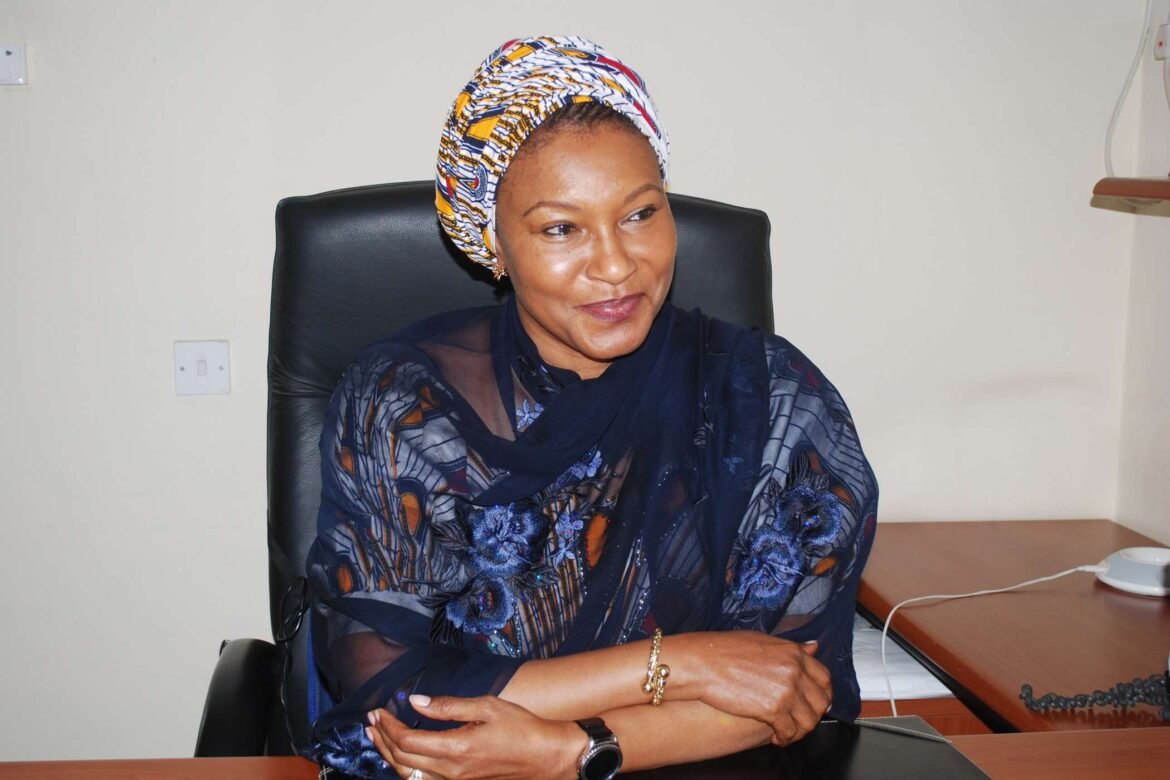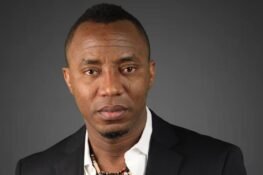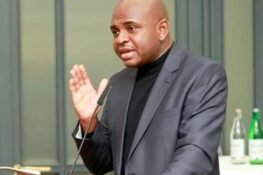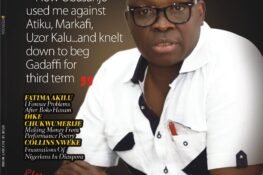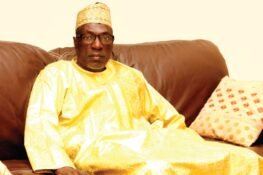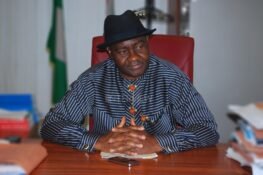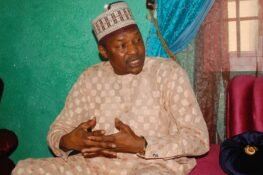Ireti Kingibe, a Civil Engineer and wife of the former Secretary the Government of the Federation, Babagana Kingibe, is running for the sole Senatorial seat of the Federal Capital Territory under the flag of the All Progressives Congress.
In this interview, the advocate of women empowerment and ringside observer of Nigeria’s volatile politics, fielded a range of questions that locks the reader down from start to finish.
When you left the PDP in 2014, some thought you were done with politics. What brought you back into it – and into the APC, this time?
Well, I started my politics in the opposition, in ANPP. I actually went to PDP under a little bit of duress because of my husband. Most people thought it would be neater if we were in the same party.
So, I joined PDP. I was there for five years or so, but it was very turbulent. I was constantly doing anti-party and constantly never agreeing with them. So, when I heard what was going to happen at our primaries in 2015, I decided there was no real compelling reason for me to be in that party anymore. So, I withdrew from the party, I withdrew from the race.
I have never been one to sit on the fence; I promptly joined APC. I have always been a strong supporter of President Buhari since 2003; and I worked for him in 2006. After joining the party, I worked for the FCT, I was invited to join his entourage to campaign in 2014, 2015. And I did.
Subsequently, I was made FCT APC leader and I have been working very hard for the people of FCT. The parties, as they stand now, don’t have very strongly defined ideology. So, I focus more on the people in the party.
Focusing on the people, isn’t that an ideology in itself?
In a way, it is because parties are made up of people and it is the caliber of people that you have in your party that will determine the kind of party that you have.
So, I focus on the people, the kind of person that you are more than all the other appendages that are attached to you. Are you a good person? Are you a credible leader? Do you have capacity? Are you committed? Those are the issues for me.
Not for the first time, you are running to occupy FCT’s sole senatorial seat. Why the FCT and not Kano?
Well, because I am also a firm believer that where you live is what really matters, not where your ancestors come from. I have lived in the FCT, I would say for at least 30 years on and off. In that time period, I don’t think I have been out of it for a couple of months at a go. And this is the place where it feels like home to me.
This is the place where it matters what is happening. If there is no light, if there is rioting. If I had my way, I wouldn’t have state of origin on any forms, it would be state of residence because I think this is what will unite us. You can come from Taraba and decide you are going to live in Bayelsa. That should be fine.
Do you think the Buhari administration has been fair to women?
No. The Buhari administration could have done more for women. I am hopeful that in 2019, they will do more. But so far, if I said that I was pleased, that would not be true.
What, in your view, are the issues that FCT residents care about and what do you intend to do about them?
There are many. Let me start mentioning some of them. FCT is not treated like a state, even though the Constitution says it should be so treated. We don’t have policies in place that will make us enjoy the status of a state.
Most of the time, we are ignored – the indigenous people as well as the residents. Even if it means we redefine residency as opposed to just the 12 months the Constitution requires you to have lived in a place to run and I think that is anywhere in the federation. But maybe we need to redefine residency and therefore allow the people who have lived here to access certain benefits.
You may have lived here for 30, 40 years and your children don’t have quotas and University of Abuja is right around the corner. The Federal Polytechnic in Abaji is almost ready, but not quite. The people have been asking for it for a long time. A lot can be done.
Also, one of the things that needs to be addressed is the delineation between commercial and residential areas. Now, they have mixed them all up and nobody is really doing much about it. So, you come out of your house and there is nowhere to walk, there is an office nearby, they’ve parked cars all over the very narrow road that was just meant to be residential.
Security too has gotten really bad. It is not going to improve unless you empower young men and women. As long as the youths are roaming jobless, then the crime rate will be high. That is the truth. To address security, you need to go down to the root cause of some of these things.
Anybody who lives here, if you go to Zone 4; the other day, I saw some women and a man nearby made a comment about them. I told him as senator, I would have liked to talk to those women and find out if there was some other way to rehabilitate them because I don’t believe the women were doing what they were doing because they wanted to. I believe it is because they don’t have a choice.
For a lot of residents, paying school fees is an issue. What can be done?
I am not sure specifically what I can do but if I look at the laws that exist and look at the regulation, working with the Ministry of Education, maybe we can address it but I don’t think it’s just FCT; it is all over the country that school fees are not regulated. But then there is the flip side. Can you really tell someone who has invested in education how much to charge?
Senator Phillip Aduda, your main rival, is a two-term member of the House and also a two-term senator and an indigene. How do you hope to depose him?
I think Sen. Phillip Aduda has given his best to the FCT and Abuja needs a change, to begin with. We all know that. Not to knock at him, I think he could have achieved more. And comparing him to previous senators, Aduda has underachieved. And FCT has also grown. It requires more qualitative representation.
Sen. Aduda has always had government impose him most of the time. This time around, we are actually going to have free and fair elections and I don’t see him winning. That is one.
Secondly, the time when being an indigene was an issue has passed. The residents and the non-indigenous people are a lot more. So, I think now, both indigenous and non-indigenous just want to get the best representation they can get. And it isn’t about your tribe anymore.

Ireti Kingibe, a civil engineer and wife of the former Secretary the Government of the Federation, Babagana Kingibe / Photo: The Interview Magazine.
What about if it turns out you are going up against Khairat Gwadabe?
I am already going against Khairat Gwadabe at the APC primaries. She was in PDP, she just joined APC last month. Really, the way the parties are structured and you are going to delegate-elections make it very unlikely that you, male or female, can join our party last month and then go into primaries in September and you make much of an impact. That is number one.
Number two, considering that she has been out of FCT politics for the last 16 years, she has a lot of grounds to make up for. So, the people I am focused on are the men I have been going up against for the last 16 years and have been in the party with me from inception. It is not her.
The FCT administration pays little attention to infrastructure development in satellite towns and local councils outside of AMAC. Do you have any plans for hinterlands?
Definitely. But whatever plans I have, they have to be in conjunction with the Minister because it is the minister who is in charge of the administration of the territory. But, obviously as a senator, if I do get there, my knowledge of the territory and the problems will be a big asset because ministers always come from outside.
For one thing, I think that farming is highly neglected in the FCT. And it is one of the main professions of the people and it also a huge potential for empowering young people. There are many different intervention programmes all related to agriculture that can be implemented with the cooperation of the Minister.
A lot of the funds for agriculture in the CBN can only be unlocked by the state in spite of the fact that it goes directly to the end user. If we focus on two, three, four of the programmes in the FCT, I think we would see a huge difference in the empowerment of young people.
What are your three major priorities?
The main one would be to work in every way to empower the youth. It is critical because a lot of other problems stem from there. Secondly, FCT has been asking for a mayoral bill. We would have liked to have a mayor in Abuja.
Most senators that have been in the National Assembly in the past have worked on it, but somehow, we haven’t quite achieved it. I will work on it and see how I can achieve that. Thirdly, I think that housing for low income people has not been addressed adequately.
I would also like to look at all the policies that have been preventing residents from benefiting from health programmes, education programmes and all the rest like employment. I would like to look at why we don’t benefit from them and to put policies and systems in place to fix it.
it has been the attitude of most women, when they get any position like minister or whatever, they are not interested in anything else that is going on with other women
Do you think the territory would be better administered if it was headed by an elected official, like a mayor?
I think it would because, for one thing, perhaps the mayor would be coming from within the residency of FCT. So, he would be more aware of the problems that are there.
He would also be accountable to the people and therefore, if we are not happy like every other elective office, we have the option of changing him until we get people who are working for us, who are capable.
Since 2007, the FCT has been represented in the Senate by indigenes, but there has been a huge influx of non-indigenes over time. Don’t you think the indigenes deserve some kind of representation at the national level?
Unfortunately, you cannot impose the minority on the majority. The way FCT has been growing, everybody needs some kind of representation because some people have lived here for very long. And who is an indigene? You have Gwari, you have Koro, you have you have Basa, you have Ganagana, you have Igbira, you have Tiv. So, who is an indigene? An indigene is just somebody whose ancestors have been here for much longer than others.
Give us another 50 years, our children would be indigenes as well because they would have lived here that long. So, I think Nigeria should move away from tribal politics to politics of capacity.
Obviously, if you get a capable senator, he or she will serve the interest of both the indigenes and the non-indigenous people. So saying that Sen. Aduda who has been in the National Assembly since 2003 is Gwari does not mean anything, except if you’re insinuating that he has only served the interest of his tribe. What happens to all the other tribes if you are talking of indigenous people?
They didn’t benefit anymore than the Ibos or Yoruba’s or Hausas did. How then do you decide to elect only indigenes? Indigene does not just mean Gwari. Gbagi is just one tribe from all the tribes in FCT. Unfortunately, maybe because Sen. Aduda has been there for eight years, he has somehow made indigene synonymous with Gbagi, which is not true.
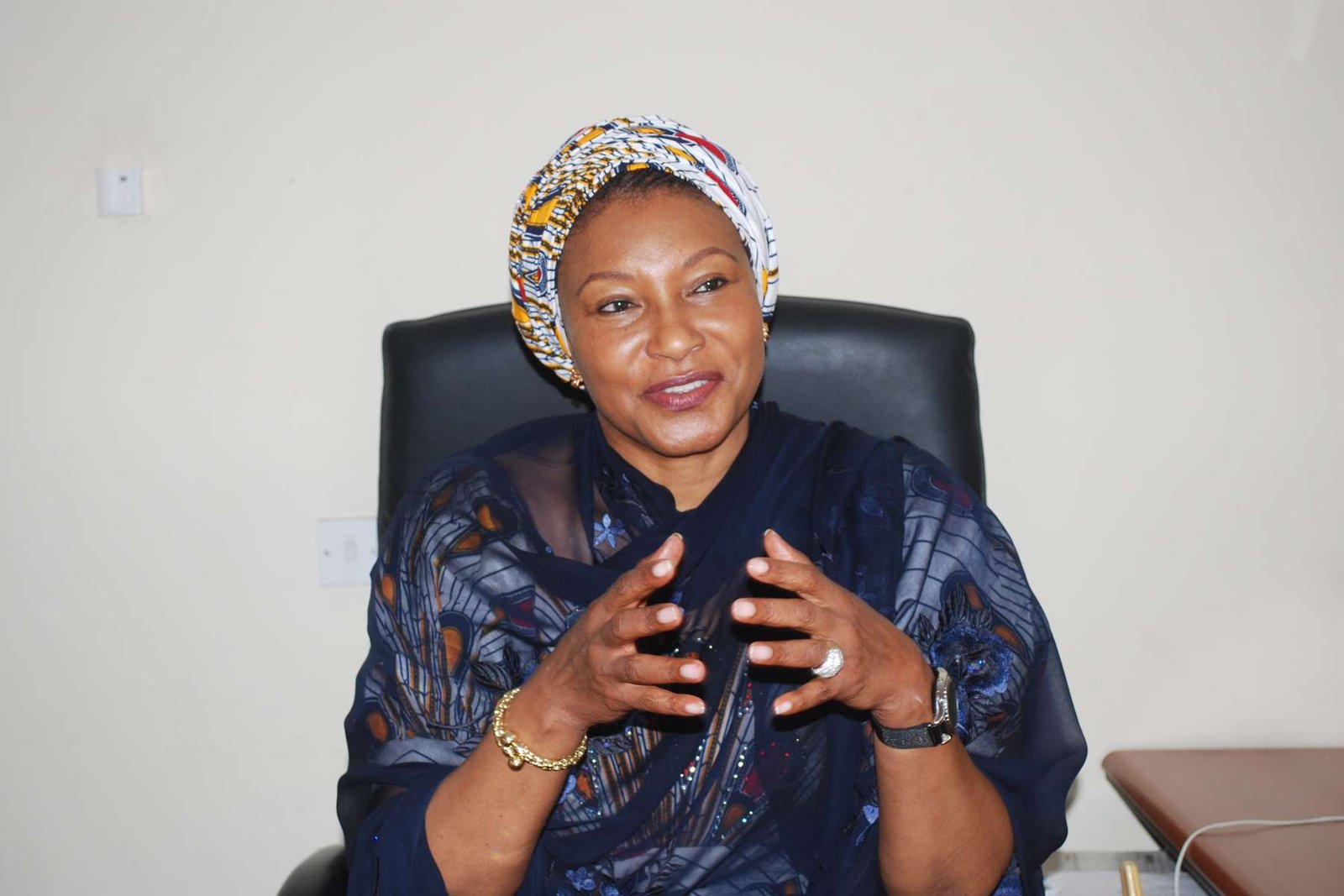
Ireti Kingibe, a civil engineer and wife of the former Secretary the Government of the Federation, Babagana Kingibe / Photo: The Interview Magazine.
Many people have expressed concern about the role of money in the primaries. What has your experience been so far?
In the politics of Nigeria, money has always played a part but in 2003 when I ran, I didn’t use money to get my ticket. Money plays less of a part in opposition parties. That is the truth.
In 2003, I was in ANPP. I was in opposition. I did my best with the little money I had, and I made a big impact. I must say that money played more of a part when I was in PDP than in APC. Even this time around, I think it will play less of a part in APC.
But now you are in the ruling party
But still, it is more a party of the people, for the people. A lot of people do not have that kind of money to throw around in APC.
Rwanda, Senegal, South Africa, Uganda, Zambia and Mauritania all rank well ahead of Nigeria in the league of women in parliament. How can Nigeria improve its ranking?
I have always felt that any underprivileged group needs affirmative action. They really do. And that is the only way to go about it. I know that in Indonesia, and I asked the foreign minister when I saw him, how did you get such a law passed. They have a law that one third of everything, elective, appointed, anything must be women.
He said to me, the first third, not the last third. I asked what does that mean? He said if there were positions to fill with six men and three women, I must fill the three women first before I am allowed to fill the six men. So, unless I get the three women, we don’t start. And then I asked him, how did you achieve that?
He said they got a lot of pressure. I know that it is a male dominated society. They got a lot of pressure from civil society, press. Everybody put pressure on them that they passed such a law. Until we can do that, until the men can see that for Nigeria to progress collectively, we do need women involvement in policy making.
Do you think Nigeria is ready for such a law, especially politicians?
Nobody gives you anything. The women themselves have to be ready to lobby them. Also, the parties need to take a lot of responsibility because if the party did some affirmative action for women, I don’t think they do enough, they pay lip service to it in a superficial sort of way, then we will start getting the critical mass in the National Assembly and only then will we get to pass the laws that are required.
Don’t you think the women also have themselves to blame, after all, we have had women in really powerful positions, like Ngozi Okonjo Iweala or Diezani, in recent times.
I agree, women do deserve some blame. We are not supportive enough of one another. Secondly, it has been the attitude of most women, when they get any position like minister or whatever, they are not interested in anything else that is going on with other women. That is the truth.
You never see them at gatherings to promote gender equality. You never see them at anything to do with women. They just live to attain what they want and that is that. But the First Ladies have all tried. Maybe you can say they didn’t try enough but did try.
The President’s wife, Aisha Buhari, is very vocal about politics but not necessarily about women in politics.
She is vocal generally and she is vocal about women. Maybe you haven’t heard her talking about women, but she is. Women and women in politics, she recently just had a talk with women in politics to say that we should insist on more representation.
We had a women’s political aspirant forum recently, which the whole point of it is to encourage more women representation in our political space. She even got her husband, the President, to attend.
Buhari himself was pushed out of the ANPP because of differences with some ANPP Governors. Today, he pays little attention to the foot soldiers that are the engine room of a political party. Do you think the President tends to take the party for granted?
I wouldn’t know. I don’t think so. I haven’t spoken to him about it and I don’t know what his stand is or what his opinions are about the party.
Let me rephrase the question: do you think Buhari uses and dumps people?
It would seem like he abandoned them all. But I think you have to understand that maybe before he became President, he had more direct influence. But after you become president of the whole country, there are so many other factors that the President has to deal with.
And maybe those of us in his party expecting him to focus so much attention on us might be a little bit unfair because all the problems of Nigeria are now on him, not the problems of APC.
What has been your personal experience with him?
Well, I have known him since 2003. I campaigned with both in 2003 and 2015, and even when I wasn’t in his party, I always worked for him because I personally believe in him as a person. In truth, since 2015, I have felt neglected somewhat, but perhaps it’s not all his fault because there are so many of us and there are so many problems he needs to deal with.
Also, between 2003 and now, the President is older, and he probably is not as energetic or as passionate. That was one of the things I liked about in 2003, the fact that he was very passionate about issues and about Nigeria. And being President, who knows all the factors that influence you!
Yes, it is true, I interacted more with him personally before he became president but that is not surprising.
The President assented to the Not-too-young-to-run bill only for the APC to put a price tag on its nomination forms for all elective offices that are out the reach of young people. Why do you think this happened?
I have no idea but yes, definitely the fees are too high for Not-too-young-to-run. But I still feel that, I feel the fees are a little bit steep. But maybe there are a lot more administrative issues that were not there before. I don’t know. It could also be a way of decluttering the space where you find so many people running for one position.
At the end of the day, the reality of the politics of today is that if you can’t afford to pay for the forms, then you can’t really afford to run a campaign. However, you are sourcing your funds, whether you are getting donations, your personal income, whatever, if you can’t raise enough to pay for the form, then you probably can’t raise enough to run a credible campaign.
What impact do you think the high cost of nomination forms will have on the country’s politics years down the road?
I don’t see it affecting politics years down the road; maybe this election, but certainly not that it would affect politics down the years.
Your husband was recently awarded GCON. Some criticised the government, claiming that Kingibe betrayed Abiola. What’s your view?
I would rather not talk about him because we are not married at the moment. You want to get my opinion on past events?
The question really is to get a sense of your early exposure to politics.
It’s not a view. I know that Kingibe did not betray Abiola because I was there. I am not just saying this. I think I am one of his most vocal critics. But that aspect of criticism is not fair, and it is not true.
Whether Kingibe deserves national honors or not, if you are giving it to June 12, then he was part of it. But saying that he betrayed Abiola (I have nothing to gain from telling the truth), was unfair.
Maybe a lot of people didn’t see what he went through himself. He also did not care to make it public. Everybody says Kingibe betrayed Abiola, how? Nobody tells us. At least I haven’t been told.

Ireti Kingibe, a civil engineer and wife of the former Secretary the Government of the Federation, Babagana Kingibe / Photo: The Interview Magazine.
He abandoned the mandate and worked for Abacha.
In case, you want to know, it was a decision – and you can verify with Abiola’s widows – it was a decision that they made collectively that not just Kingibe but remember they had Jakande and so many people from the Abiola/Kingibe camp in the government.
They were under the misguided notion that Abacha was going to hand over to them. And really, as I have said over and over again, Kingibe is no longer my husband and I am under no obligation to say anything good about him. But I also do not believe in telling lies. And as I have said to many people in the past, they are all guilty of bad judgement and not bad will.
Your husband reportedly told a newsmagazine at the time that he felt shut out or distrusted by Abiola at some point. Did he share his frustration with you?
Is this interview about him or me?
It’s about covering the issues that have influenced your politics including your support for Buhari, your challengers in FCT, too. It’s only natural that we talk what about happened in the past. June 12 happens to be one.
The truth is that Abiola needed Kingibe to win the elections but may not have been as comfortable with him as he should have been. When Abiola left Nigeria, I think it would be really strange to run away from the country and you are not going to say anything to your running mate.
In truth, Baba Kingibe only went to see Abiola and found out that Abiola had left the country. And when Abiola called from abroad, it was me he got. Those days we had landlines. Baba was not at home. I picked up the phone and he said to me in Yoruba that I should tell him that a bird does not tell another bird that a stone is coming.
So, when Baba came back, I said Abiola called and this is the message he left for you. Baba said to me, ‘did he call to apologize?’ I said no, he did not call to apologize. He just gave an explanation or a rationalization for his action and this is what he said. He ‘no, no! You didn’t understand his Yoruba well.’
I said you can go and find out from anybody. I can’t discuss their relationship, I can’t discuss the depth of it. I can only discuss my perspective of it because I was there at the time. Yes, I did think when Abiola went away, came back, Kingibe stayed in the country and stuck it out to the end, though his passport along with mine were seized.
Even then, Kingibe had advised that when Abiola returns to the country, he should land in Kano Airport because it is being said that Abiola is a Yoruba president. And that is not true because it was only three states that he did not get the requisite 45 percent or whatever it was.
Most of the states voted for him. If he landed in Kano, people would come from all over the country to meet him and therefore disprove that point. But of course Abiola didn’t agree because he wasn’t as political as Kingibe and couldn’t see some of these things the way Kingibe could.
Even being in Abacha’s government, I know how badly Kingibe didn’t want to be there. I have had this conversation some years back and I said the truth is that Kingibe was held hostage by Abacha’s government. But I know and I am talking about it as an independent person who witnessed it. So, all those things a lot of people have said are not true.
‘Look I am sorry. I have the youngest children in this family. Your options are three: work with Abacha, Abacha kills you, or he puts you with Abiola. He cannot put you with Abiola now. It is too late, it will be based on what? It is either you work with him or he is going to kill you. So please, there is no way out of this.’
Did you get a hint of his decision to join Abacha’s cabinet before he did so?
There was no hint. It was just a decision collectively that the Abiola camp made. I was there.
When you say collectively, are you saying Abiola too was involved in that decision?
Oh yes. He was, definitely. I didn’t want it. When it was even suggested that Kingibe should not have a portfolio, Abiola suggested that one of them needed to be there to keep an eye on things. I always believed that Abacha had no intention of giving them back the mandate. But they didn’t see it that way.
The decision for Kingibe, Babatope, Jakande and the rest of them who were from June 12 to be in Abacha’s government was taken collectively and at the time that this was happening, I knew instinctively that this was a wrong decision.
But Abacha only needed them to stabilize himself and once he did, he removed everybody else leaving only Kingibe. And as I told anybody who would listen in 2006, because I went and personally saw Wole Soyinka about it, had a chat with him. And I told him, I said, ‘Kingibe had no choice’. Once he was in there, there was no option of leaving.
Even after Abacha had gotten rid of everybody else, there no way he was going to let Kingibe loose. He wasn’t going to let Kingibe roam about and there was no way to elegantly put Kingibe with Abiola anymore.
It was either Kingibe stayed in his government right in front of him or he buries him, Kingibe is dead. There are no two ways. There was a time when Kingibe was upset enough, when Saro-Wiwa was killed, he did not go to work for three weeks.
An old friend and confidante of his, who is now dead (Alhaji Mamman Buhari) came to meet me. He said, look, Baba has not gone to work for three weeks. He thinks Abacha is going to sack him.
I went to Baba and I said, ‘Look I am sorry. I have the youngest children in this family. Your options are three: work with Abacha, Abacha kills you, or he puts you with Abiola. He cannot put you with Abiola now. It is too late, it will be based on what? It is either you work with him or he is going to kill you. So please, there is no way out of this.’ That is the truth.
Do you think he’s a misunderstood man?
Who, Kingibe? Most definitely.
And yet, his story has never really been told. How come?
He has not offered his story or his opinion. It is his story. If he is not willing to tell it, he is not willing to tell it. You asked me from my vantage point. And the day he was announced as the minister of power and steel, he sat in a chair and tears rolled down his eyes. He said to me, ‘I am never leaving this job, am I? I said no, you are not’.
The only thing that set Kingibe free was Abacha’s death. So, when people say he was in Abacha’s government, nobody thinks about what he was doing in Abacha’s government. Why didn’t he just ride away. Because he couldn’t, plain and simple. It is my opinion, as somebody who was married to him for almost 30 years, that he is misunderstood.
Who is your role model?
My role model, dead or alive? Nelson Mandela, because I think that human beings should always try to be better than they are, and to be greater than their situations.
That’s one of the things that I aspire to be and to do. That is to rise above every bad thing that happens to me. I have found that Nelson Mandela epitomizes all the things I think are great in a human being.
